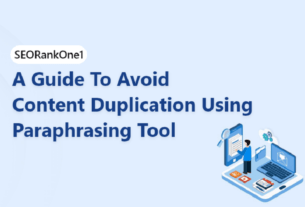From Google AdWords to longtail keyword phrases, various businesses adhere to multiple strategies for achieving better search engine optimization (SEO). Yet, how will a business gain some knowledge on whether an SEO strategy is actually doing its work correctly? Sure, a business might already be monitoring the outcomes of the AdWords campaign and tracking conversion rates. However, these pieces of data only provide partial details of one’s SEO strategy’s successes or lack thereof.
Likewise, whether you’ve seen an increase or sudden decrease in web traffic, the cause for this traffic change is often more complicated. Maybe a competitor is more efficient in optimizing for similar keywords that you use; your most current content marketing campaign may have become a failure or success, or maybe your website has been penalized for over-optimizing.
Regardless of the reasons, knowing how to monitor your SEO performance broadly is crucial. You should leverage this as one of the advantages of having an SEO campaign over an old-fashioned, offline marketing campaign, as every piece of data can be monitored and is just there to be analyzed.
SEO monitoring lets you know what’s effective in your campaign and what needs further adjustments. In addition to assisting in tracking campaign progress internally, it also helps you clearly show the significance of your SEO services to customers by allowing your brand to have more authority and offer a better user experience. This will likely improve customer retention.
Altogether, if you want to know how to monitor your SEO, this article listed some crucial steps that you can use to achieve that.
How To Improve SEO Monitoring In 3 Steps
Track Keyword Rankings
Keywords are a crucial factor in SEO and one of the things that are monitored. With SEO keyword monitoring, you can stay updated about the ranking of your website on the search engine results page (SERPs). This enables you to plan on how to rank higher and have more visibility.
Likewise, as your site ranks higher and generates more visibility through proper keywords, this can be a factor in generating more website revenue. The reason is that having your site rank high through your most important keywords will result in higher potential traffic.
To apply this, one example is that if you want to rank for chiropractors-related keywords, you may need to do keyword research to have informational and commercial terms related to chiropractors, such as:
- Chiropractors near me
- How much do chiropractic services cost?
- Book a Chiropractor in (location)
Identifying and targeting specific keywords among tons of other keywords is vital in this step. Creating an effective keyword strategy such as the one above necessitates you to conduct keyword research on the industry you’re ranking for.
This is crucial as choosing the wrong keywords and ranking poorly will likely result in losing potential traffic and leads, conversions, and in the end, possible revenues.
Likewise, you can also make use of raw information from your competitors to strategize your keyword targeting. You can do this by scraping their website data while using proxies with residential IP addresses to prevent access blocks from various websites and also prevent detection.
Track Your Website’s Traffic
One of the most significant metrics you can monitor is traffic. It shows how many are going to your website and where they originate. Your objective for website traffic is to know the complete number of users increases. Tracking your site’s traffic allows insight into your site’s popularity, performance, and growth as time goes on. It shows the impact of your strategy on various individuals.
Note that traffic growth can result from:
- Achieving brand awareness and popularity
- Building reliable links and backlinking
- Optimizing your website for your ideal key phrases and target keywords
Likewise, to view changes in traffic flow, you can use various SEO monitoring tools that provide analytics. Some analytics apps offer custom alerts that give you notifications for particular percentages of reduced traffic. The customs alerts compare your traffic automatically so you can measure the changes in your long-term performance.
Regarding the idea of driving the right kind of website traffic, know that obtaining the wrong leads can significantly affect your metrics and make it more challenging to assess what your actual target audience is responding to. Not only that, but it can also adversely impact your SEO score and allow Google to treat your site with less priority because visitors seem disinterested in your content.
If you see a mixture of the following, then you might have the wrong site traffic:
- Low conversion rate
- High bounce rate
- An extensive number of pages per session with a low amount of time per session
Altogether, monitor trends and changes in your site’s traffic over time. For most small and medium-sized companies, monthly or quarterly traffic comparisons are ideal for gauging the attainment of goals and improvements in growth.
Track Conversions
The main objective of any SEO campaign must be to have more conversions. This could consist of someone sending a lead to buy a product from your site or sending or booking an appointment. These things will best show that your campaign has direct revenue.
Note that though it’s also good to have tons of organic traffic and high keyword rankings, you need to maintain your site to have more conversions. It could involve adding more reliable links to deliver users to your conversion pages to fixing your conversion pages for any technical issues limiting individuals from buying your products.
Likewise, if your business isn’t attaining the ideal conversion numbers, you may want to examine your goal path in various analytics tools to know where your business is losing visitors.
If you can assess why your visitors opt out before becoming a part of your business’s conversion, you can revisit that part of your site and make the necessary adjustments to keep them engaged.
Altogether, your conversion rate shows your SEO strategy’s overall effect on sales. You can say that this is the most crucial metric in analyzing your website’s success. In the long run, you need to have a site that lays out your products or services and leads to better conversion of leads to customers.
Conclusion
SEO monitoring allows for evaluating a business’s effectiveness with campaigns. It also helps with client retention by offering a better user experience and becoming an authority in your field.
Likewise, there are steps to improve SEO monitoring. Some actions are to track keyword rankings, site traffic, and the number of conversions. Overall, consider sharing this information with others.



